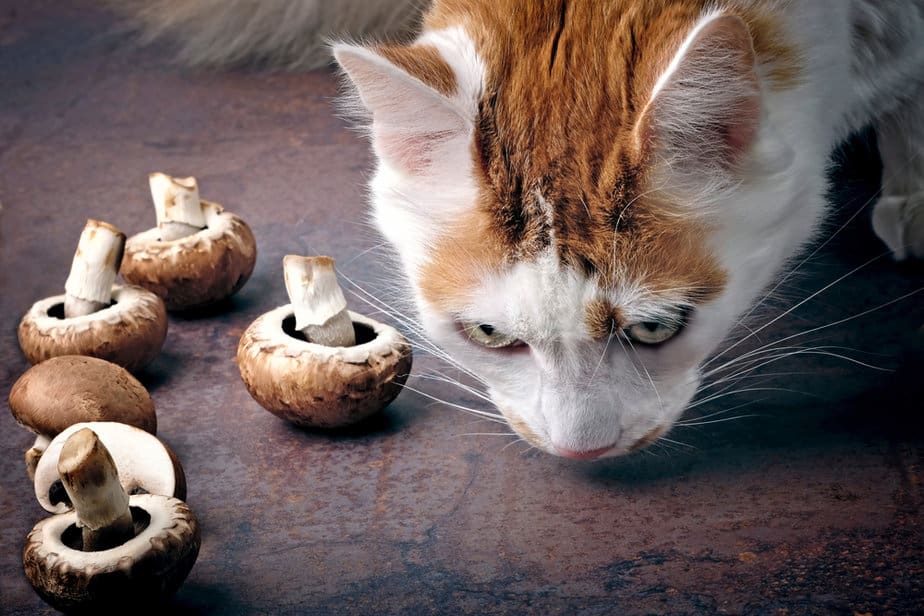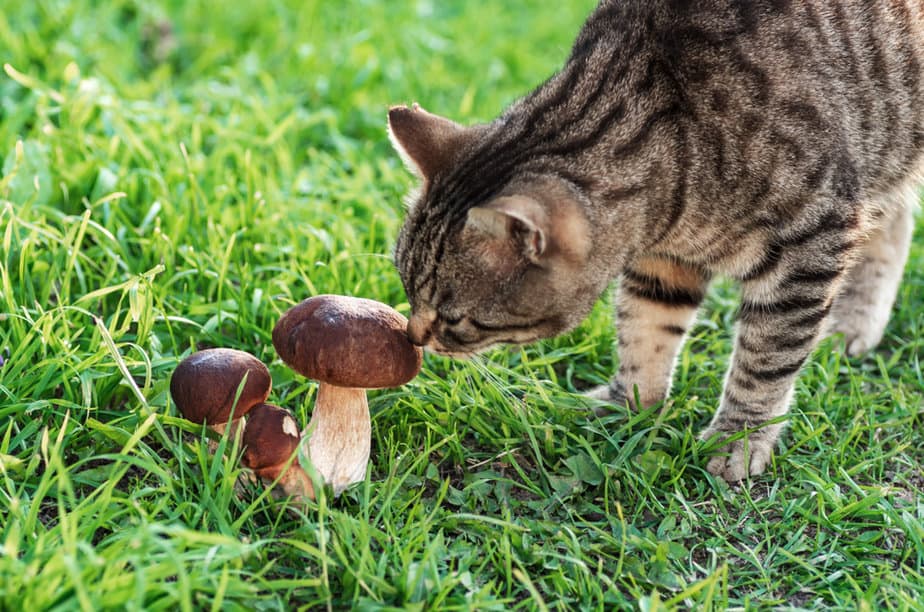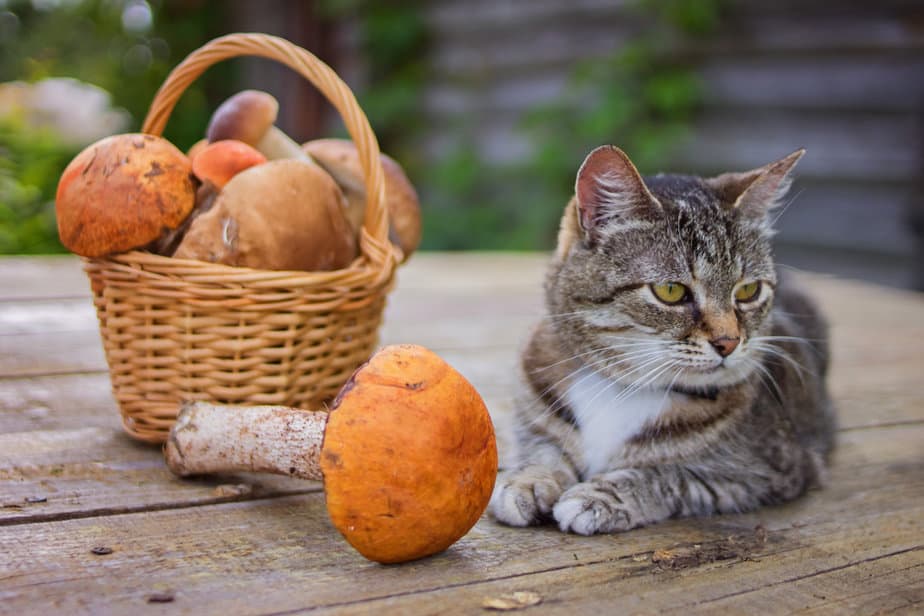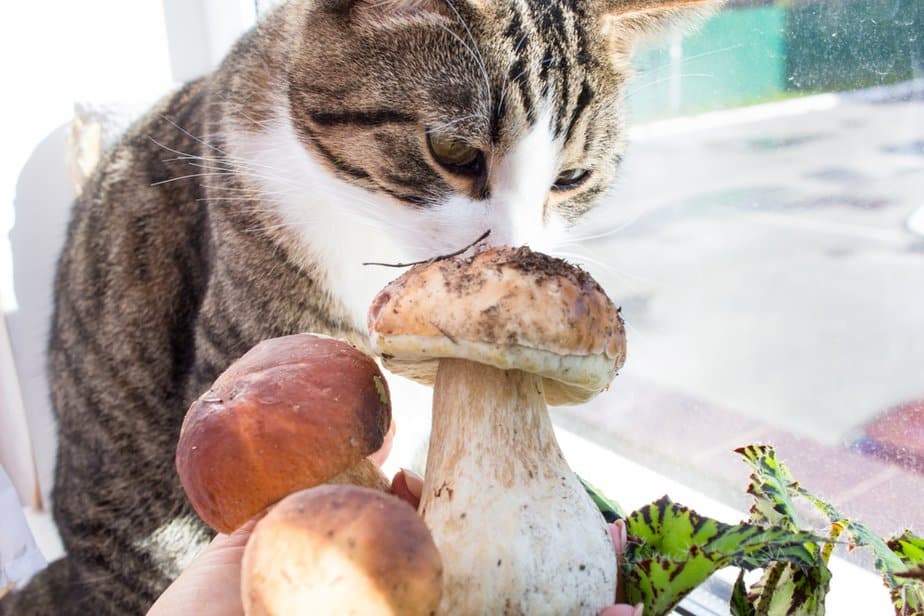📖 Table of Content:
Creamy mushroom stroganoff, Funghi pizza, mushroom jacket potatoes, mushroom soup – mushrooms everywhere! And you’re not complaining at all, but can cats eat mushrooms?
Since my favorite season is fall, I guess it’s normal that I absolutely adore mushrooms. Preparing them in different ways, and cooking for my family new mushroom meals once in a while, is something I truly enjoy.
This time I was making one of my all-time favorites – chicken breasts in curry sauce with mushrooms. I bought all the ingredients at our local shop and I started preparing the meal. I’ve been cooking this one since I was a kid, so I know this recipe by heart.
While I was cutting golden Italian mushrooms, my curious feline decided to join me in the kitchen. She started meowing and gently touching my foot with her paw, indicating that she was up for some food.
Did the smell of the mushrooms I was cutting attract her to the kitchen? Probably.
I tried to ignore her, but she wouldn’t leave me alone. She was persistent in drawing attention to herself. Should I give her a few pieces of crimini? I wondered.
I wasn’t sure, so I did what every other human being does – I googled it. Typing in a simple sentence can cats eat mushrooms helped me to discover a wide range of information. I truly didn’t want to spend all my time swimming in the sea of online info (ain’t nobody got time for that!) so I checked out the first one.
It said store-bought mushrooms can be safe for cats and that was enough for me at that moment. I gave her a couple of bites and continued working.
However, my consciousness was guilt-tripping me…
Can cats eat mushrooms safely?
I don’t have to tell you what I did after I prepared lunch. That’s right, you guessed it. I sat down in my living room, took the laptop, and started surfing the web.
Can cats eat mushrooms? Is it safe for cats to eat crimini? Are mushrooms poisonous to cats?
I typed those and a lot more questions because now I was super worried. What if I gave something harmful to my furbaby?
Fortunately, it turns out that cats like mushrooms and it’s completely safe to give them smaller amounts sometimes. I could finally relax a bit, but I wanted to know more.
Cats cannot taste sweet food, but umami or savory food is something they actually enjoy. Their taste buds are sensitive to amino acids found in mushrooms as well. So, that’s the reason why our little furballs want mushrooms – they’re tasty!
Honestly, I can’t argue with that. They are also used a lot as substitutes for meat products, so no wonder this little carnivore was pleading to eat them.
Just make sure you give your cat mushrooms only as an occasional treat if you really want to. They should never replace your kitto’s normal food.
You’re well aware that there is a wide range of mushrooms out there. Some are poisonous, others aren’t. Which ones are good to go then?
Next time you start thinking about this, keep in mind that if it’s not dangerous for you, it won’t be dangerous for your feline either. (Disclaimer: This only applies to mushrooms though, since some human food can be extremely toxic to cats.)
Raw mushrooms or cooked, but without any seasoning, can make for a delicious snack for your furkid. But make sure that you feed kittens only with food that is specifically made for them. Don’t try to experiment at all, because their digestive systems are exceptionally sensitive.
Also, steer clear of any wild mushrooms, not to mention psychedelic mushrooms of any kind. Avoid them at any cost, because they can easily poison your cat. So, now that we’ve covered some basics, it’s time to check if button and shiitake mushrooms are safe!
Can cats eat button mushrooms?
Button mushrooms or champignons are safe for cats to consume, but only from time to time and in small doses. They contain fiber that actually helps digestion, and riboflavin and niacin that boost the immune system and make fur healthier.
However, these are most commonly used to prepare pizza, which is not recommended for cats. If you really want to share a mushroomy meal with your feline, make sure you prepare the mushrooms separately and without any seasonings or additives, as previously mentioned.
Can cats eat shiitake mushrooms?
Similar to button mushrooms, shiitake mushrooms are full of nutrients that are important for your pet. They will also help strengthen the immune system and have various other health benefits.
When preparing shiitakes, again, avoid seasonings or adding anything that may be risky. You can prepare mushroom broth for your feline if you feel like it.
You just need a few different species of mushrooms, fresh or dried. Cook them together, blend and serve to your adorable pet. You can also make ice cubes out of it and let your cat enjoy that treat later on as well.
What are the signs of mushroom poisoning in cats?
The time has come for us to talk about what happens if cats eat a poisonous mushroom. How can you know? What are the signs that she consumed a toxic one?
First of all, she’ll become ill. Depending on how much she ate, her symptoms may range from mild to severe. Vomiting, diarrhea, and abdominal pain are just some of the problems she may encounter. The effects of a toxic mushroom greatly depend on the toxin it contains.
Some mushrooms have a gastrointestinal toxin that will upset her stomach. Consuming muscarinic mushrooms may cause dehydration, diarrhea, and vomiting. If your cat is very weak and visibly exhausted, don’t think twice before taking her to the vet.
The second toxic type of mushroom is neurotoxic, such as hydrazine, isoxazole, and psilocybin mushrooms.
As the name of the toxin type implies, it influences the nervous system. If your cat eats one of these, she’ll be disoriented, and she may experience a lack of coordination, uncontrollable shakes, and even a stroke.
Another toxic mushroom on our list is the nephrotoxic type, which directly affects feline’s kidneys. The symptoms of poisoning with this kind of mushrooms are usually delayed by up to one week. Unfortunately, a lot of damage can be done before you notice that your cat is poisoned.
Last but not least, we have to mention hepatotoxic mushrooms. They influence your pet’s liver and the most common is the amanita mushroom.
In the first 24 hours after poisoning, your cat will go through typical gastrointestinal symptoms. Other symptoms may include yellowing of the skin and extreme weakness and passiveness.
This usually masks the real damage, since most cat owners rush to treat stomach problems, and they don’t even pay attention to their feline’s liver. You have to be aware that liver failure is lethal. If you suspect that your cat may have eaten this mushroom, get medical help right away.
In conclusion, mushrooms are considered safe for your little feline, but in the right doses and appropriately prepared. You have to pay attention to the toxic species we’ve mentioned in the article and react ASAP if you notice any symptoms of mushroom poisoning.




